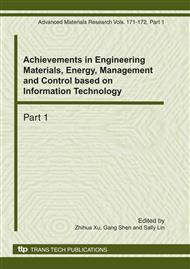p.394
p.399
p.403
p.408
p.412
p.416
p.421
p.425
p.429
Impact of Technological Progress on Energy Resources Intertemporal Extraction Sequence
Abstract:
Technological progress is an important and complex factor which affects extraction sequence of energy resources. Based on the resources intertemporal extraction model, by means of comparative static analysis methods, we analyze the impact of technological progress on extraction sequence of energy resources. The results show that technological advance influences extraction sequence of energy resources in multiple ways, such as the stock of energy resources, energy consumption pattern, and marginal cost of mining. Different technological advance has different influence of intensity and direction. Technological progress adverse to restrain consumption may accelerate the resources depletion, but energy substitution is the effective way to achieve the sustainable utilization of energy resources.
Info:
Periodical:
Pages:
412-415
Citation:
Online since:
December 2010
Authors:
Price:
Сopyright:
© 2011 Trans Tech Publications Ltd. All Rights Reserved
Share:
Citation:


